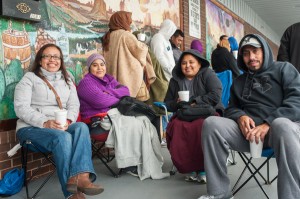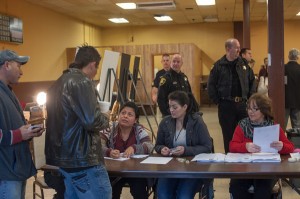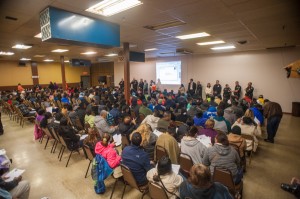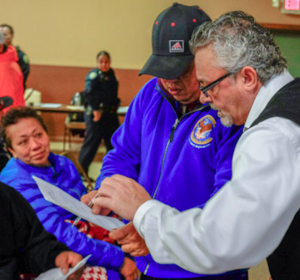ID Cards in for undocumented people in Forsyth County, NC
By Tom Peterson
One afternoon last December I found myself in the conference room of a small business in a Hispanic area of Winston-Salem, North Carolina. The nine people around the table were heavy into no-nonsense planning. They were an odd assortment: a couple of police officials, a chaplain from the Sheriff’s department and one from Wake Forest Baptist Health, the head of the Hispanic league, a local entrepreneur and a few others. The conversation is in English but heavy with a Spanish accent. The group had been working more than a to year on a plan to provide ID cards to undocumented workers in Forsythe County. The first ID signup drive was just weeks away, and they hope 400 people will sign up the first day.
Action in an awkward time
It’s an awkward time for politicians in conservative places like rural North Carolina to show the slightest support for such an initiative. They have to support it in such a way that they don’t lose their job, so the conversations are nuanced. It has to be seen in the right light. The IDs are issued by a nonprofit, not a government agency, but are recognized by the police and sheriff’s office, local hospitals and health providers, and other agencies. But it’s not an official government ID. A small but real step forward.
 The ID card will be used for health and other purposes. For example, card holders can get most prescriptions filled with it. If someone is stopped by local law enforcement, at least the officer knows who they are and this can save everyone lots of problems. The IDs still can’t be used to get a drivers license or open a bank account.
The ID card will be used for health and other purposes. For example, card holders can get most prescriptions filled with it. If someone is stopped by local law enforcement, at least the officer knows who they are and this can save everyone lots of problems. The IDs still can’t be used to get a drivers license or open a bank account.
This project grew out of the community itself. It was identified as a priority “next step” at the end of a community health asset mapping process led by my friends Francis Rivers (pictured at top) and Teresa Cutts in the summer of 2014. The ID will help overcoming the fear of getting crosswise with the law if you’re driving to a doctor’s appointment, so they just don’t go. It also will allow patients to get most prescriptions.
 The stakeholders included leaders from the Hispanic/Latino community, hospitals and public health, the sheriffs and police departments and others. They borrowed the ID program’s template from FaithAction, an organization based in Greensboro, the next city over. Besides expertise, FaithAction is lending its photo and computer technology and equipment as well as a few seasoned volunteers for the first sign-up day.
The stakeholders included leaders from the Hispanic/Latino community, hospitals and public health, the sheriffs and police departments and others. They borrowed the ID program’s template from FaithAction, an organization based in Greensboro, the next city over. Besides expertise, FaithAction is lending its photo and computer technology and equipment as well as a few seasoned volunteers for the first sign-up day.
This borrowed idea that worked in one community and spread informally to the next isn’t exactly a replication; it’s more of an adaptation, as each place is different.
So how did it go?
 On Friday, January 8, people began forming lines at 5 in the cold morning, holding their passports, utility bills and other forms. An article in the Winston-Salem Journal reports that by 5 that afternoon 580 cards had been issued. The article explains:
On Friday, January 8, people began forming lines at 5 in the cold morning, holding their passports, utility bills and other forms. An article in the Winston-Salem Journal reports that by 5 that afternoon 580 cards had been issued. The article explains:
In fact, the ID card has the support of three key community agencies: The Forsyth County Sheriff’s Office, Winston-Salem Police Department and Wake Forest Baptist Medical Center’s Division of Faith and Health Ministries.
Members of a partnership formed by the three agencies asked FaithAction to provide the ID service in Winston-Salem, according to the Rev. Dr. Gary Gunderson, vice president of the medical center’s Faith and Health Ministries.
For Gunderson, this was a health-care day.
Too often, he said, unauthorized immigrants fear seeking medical care for preventive illnesses. They let the illness get worse. Then, after the illness turns into a long-term condition, they show up, when it’s harder and more expensive to treat the illness.
Why support the ID?
“Anything that improves access to health care,” he said.
The article points to one “33-year-old man, his wife and 3-year-old” who had come for their ID card:
Their story illustrates the complicated nature of the immigration issue, particularly during an election year. Republican presidential frontrunner Donald Trump has called for the removal of the estimated 12 million immigrants living illegally in the U.S. — and then letting “the good ones” back in. On Wednesday, U.S. Sen. Ted Cruz of Texas, while stumping in Iowa as a GOP presidential candidate, was confronted by a young woman who asked if he would deport her.
“We should welcome people who come following the laws, but there are consequences for breaking the laws, and that is part of what makes America the nation that we are,” Cruz said.
Brought into the U.S. by his parents when he was 16, the 33-year-old man missed the cut-off by months to qualify for Deferred Action for Childhood Arrivals — the 2-year reprieve from deportation that the Obama administration has granted certain younger immigrants without serious criminal records.
He has a sibling who is a U.S. citizen. His daughter is a U.S. citizen.
His parents have green cards.
Other than returning to Mexico and possibly being required to wait as many as 10 years to apply for re-entry to the U.S., he does not have options to fix his immigration status.
“This is a start,” the man said.
Read more on this story at FaithHealthNC. and in the Christian Century.
Photos: Wake Forest Baptist Health.


[…] Read a related articles in The Christian Century and in Thunderhead Works. […]
[…] program, policy and service delivery changes within a few years. For example, a series of Hispanic mapping workshops held in 2014 in Forsyth County led to more respectful and improved care at a local clinic. More […]